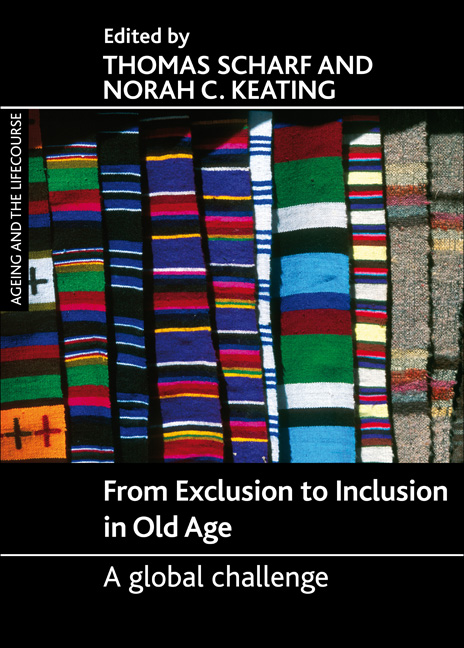Book contents
- Frontmatter
- Dedication
- Contents
- List of tables and figures
- Acknowledgements
- Notes on contributors
- Foreword
- one Social exclusion in later life: a global challenge
- two Globalisation, economic recession and social exclusion: policy challenges and responses
- three International migration: patterns and implications for exclusion in old age
- four Social inclusion of older people in developing countries: relations and resources
- five Exclusion from material resources: poverty and deprivation among older people in Europe
- six Social inclusion of elders in families
- seven The impact of changing value systems on social inclusion: an Asia-Pacific perspective
- eight Age discrimination as a source of exclusion in Europe: the need for a human rights plan for older persons
- nine Towards inclusive built environments for older adults
- ten Revisiting social exclusion of older adults
- Index
seven - The impact of changing value systems on social inclusion: an Asia-Pacific perspective
Published online by Cambridge University Press: 07 September 2022
- Frontmatter
- Dedication
- Contents
- List of tables and figures
- Acknowledgements
- Notes on contributors
- Foreword
- one Social exclusion in later life: a global challenge
- two Globalisation, economic recession and social exclusion: policy challenges and responses
- three International migration: patterns and implications for exclusion in old age
- four Social inclusion of older people in developing countries: relations and resources
- five Exclusion from material resources: poverty and deprivation among older people in Europe
- six Social inclusion of elders in families
- seven The impact of changing value systems on social inclusion: an Asia-Pacific perspective
- eight Age discrimination as a source of exclusion in Europe: the need for a human rights plan for older persons
- nine Towards inclusive built environments for older adults
- ten Revisiting social exclusion of older adults
- Index
Summary
Introduction
Social exclusion involves restrictions on social contact and social relations (Littlewood and Herkommer, 1999). For many older people, this may mean fewer opportunities to interact with relatives, friends or neighbours. Like social ostracism, it can leave the individual in a state of entrapment, isolated from society's general activities (Lee, 2001) and with ongoing reminders ‘of their own failures … and with inescapable proof of their inability to alter the unwanted circumstances of their lives’ (Pearlin et al, 1981, p 340).
There has been growing interest worldwide, and especially in the Asia-Pacific and its Chinese societies, in changes in inter-family and intergenerational relations and how these may impact on older persons’ inclusion or exclusion. This issue has taken on increasing importance in many Asia-Pacific countries, where demographic change and rapid socio-economic development are believed to be associated with a generalised decline in close family relationships, and especially the reciprocal family responsibilities known as filial piety. Therefore, when considering possible marginalisation of older people in Asian societies, especially Chinese societies, there is a need to take account of at least two major issues: demographic change; and value systems, social norms and traditions within filial piety.
Many countries in the Asia-Pacific have seen considerable increases in the numbers and proportions of older people, with concomitant changes in family structures (Phillips et al, 2010). Two domains of social exclusion on which these combined influences are likely to impact are exclusion from material resources, including employment (often causing poverty in later life), and social isolation through exclusion from family relations (often stemming from changes in filial piety). We concentrate here on the second of these domains.
Demographic trends: potential impacts on family relations and older people
The Asia-Pacific is now leading many global demographic trends such as demographic ageing, smaller families and the feminisation of ageing. Asia has more than 60% of the world's total population and also well over half of its population aged 65 and over. While some Asian countries are still relatively young, China already has more people aged 65 years or above than in the countries of the European Union combined (over 100 million versus some 80 million). Another major Asian country, India, is not far behind (at around 60 million) (Population Reference Bureau, 2009).
- Type
- Chapter
- Information
- From Exclusion to Inclusion in Old AgeA Global Challenge, pp. 109 - 124Publisher: Bristol University PressPrint publication year: 2012



